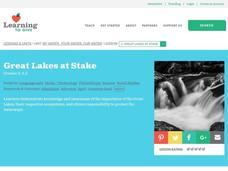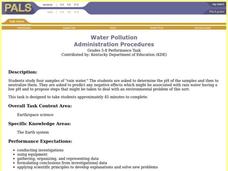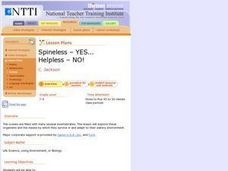Curated OER
What's in the Water?
Learners examine how pollutants can affect ocean animals. In this pollution lesson, students read a story about the ocean floor, think about what would happen to the plants and animals if the ocean became dirty or polluted, and conduct...
Curated OER
Aquatic Habitat Water Quality Experiment
Fifth graders discuss the importance of water quality for humans and fish and make predictions about what happens to water that is polluted. In small groups, they conduct experiments to compare and contrast water that is unpolluted and...
NOAA
Build Your Own Ocean Ecosystem
Hold the sea in the palm of your hand! Amateur oceanographers work together to create models of an ocean ecosystem in the sixth and final installment in a series. Raise awareness of global ocean health issues through guided research,...
University of Southern California
What's the Catch?
There must be a catch! A comprehensive lesson looks at ocean fishing concerns through a set of five hands-on activities. Learners become aware of the risks of seafood contamination and factors that have affected the ocean environment.
College Board
2011 AP® Environmental Science Free-Response Questions
Beetle population, climate change, and acidification are all real environmental threats. Scholars display their knowledge of these threats and offer solution strategies in a four-question assessment resource. Questions from the AP® exam...
Curated OER
Researching the World's Oceans
Students research and compare important features of the oceans based on current data. They examine the globe or map, determine the major oceans of the world, and record their names on the data sheet.
Curated OER
Great Lakes at Stake
Students explore conservation of the Great Lakes. For this geography and ecology lesson, students identify the Great Lakes on a map and view a video depicting the history and importance of these lakes. Students work in groups to research...
Curated OER
The Good, The Bad and The Arctic
Learners examine the impact of a major climate change in the Arctic Ocean on the rest of the world. They use the Internet to research the Arctic region and the wildlife that lives there.
Curated OER
It's Really Heating Up in Here!
Students create and observe a greenhouse effect model and discuss the implications of global warming theory for engineers, themselves and the Earth. They discover that Global warming is becoming an increasing concern as we learn more...
Curated OER
Water Cycle
Ninth graders explore ways water moves through various reservoirs on Earth, examine how human activities change water cycle, investigate substances present in water that indicate human activity, and discuss how understanding water cycle...
Curated OER
Oceanic Absorption- Oceanic Sequestration
Students examine the techniques that may be used to reduce carbon dioxide in the atmosphere. In this pollution lesson students simulate oceanic sequestration using chemistry.
Curated OER
Oceanic Absorption- Oceanic Sequestration
Students examine the different techniques that may be used to reduce carbon dioxide in the atmosphere. In this ocean pollution lesson students divide into groups and complete a lab to see how the ocean holds carbon dioxide.
Curated OER
Ocean in a Bottle
Learners create an enclosed ocean in a bottle and add different pollutants to explore the effects of pollution on the environment.
Curated OER
Fallout!
Students plot the locations of fallout from two disasters that polluted much of the world's air. They plot the ash fallout from the 1980 Mt. St. Helen's eruption to see what the wind patterns in the United States look like overall. Next...
Curated OER
Geography Action! Rivers 2001- Human River
Students create a 'human river' by arranging themselves into a river pattern. Each student selects an article to represent a pollutant such as paper, book, or pencil. Students at the source of the river pass their pollutant on to the...
Curated OER
Jeopardy 8th Grade (Science)
There are so many topics touched upon in this Jeopardy-style science game, that it is difficult to classify! The categories include electricity, matter, ecology, earth and space, and scientific investigation. This would best be used at...
Curated OER
Water Pollution
Students study four samples of "rain water". They asked to determine the pH of the samples and then to neutralize them. Students are asked to predict any negative effects which might be associated with water having a low pH and to...
Curated OER
Out of the Deep
Students observe, describe, and record characteristics of ocean animals (mammals and fish) and sea shells. They conduct an experiment comparing and contrasting sugar water, salt water and fresh water and create a mural of coral reef...
Curated OER
Spineless - YES... Helpless - NO!
Young scholars distinguish between invertebrate and vertebrate organisms while examining the zoological classes of a number of invertebrates. They illustrate a food web of these organisms and investigate the impact of humans on the...
Curated OER
Energy Resources
In this energy resources worksheet, learners read about the greenhouse effect and global warming. Then they explain why scientists are so concerned with greenhouse gases. Students also describe how global warming affects people worldwide.
Curated OER
TE Activity: Stream Consciousness
Fourth graders study how environmental engineers monitor water quality. They use environmental indicators to determine the quality of stream water in their area. They count the number of macroinverabrates and use the information they...
San Francisco Public Utilities Commission
Let's Save Water: Water Conservation
Did you know that cutting down your shower by one minute a day can save five gallons of water? Learn about water conservation with a science reading activity. After kids finish reading key terms and water-saving tips in a reading...
Curated OER
Conductivity - Pass the Buoy and Pepper, Please
Buoys around our coastlines are equipped with sensory devices which monitor temperature, salinity, and water pressure. Emerging earth scientists examine some of this data and relate salinity to the electrical conductivity of the surface...
NOAA
The Dead Zone
The fifth installment of a 23-part NOAA Enrichment in Marine sciences and Oceanography (NEMO) program defines dead zones and how they form. Pupils then examine data from the Gulf of Mexico to determine dead zone formation.

























